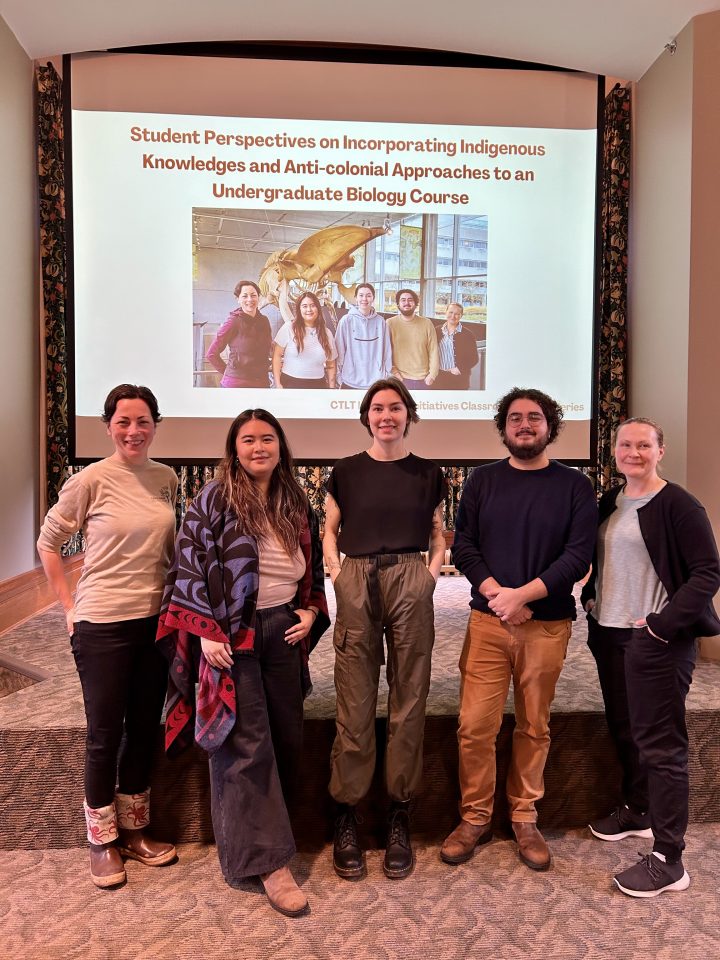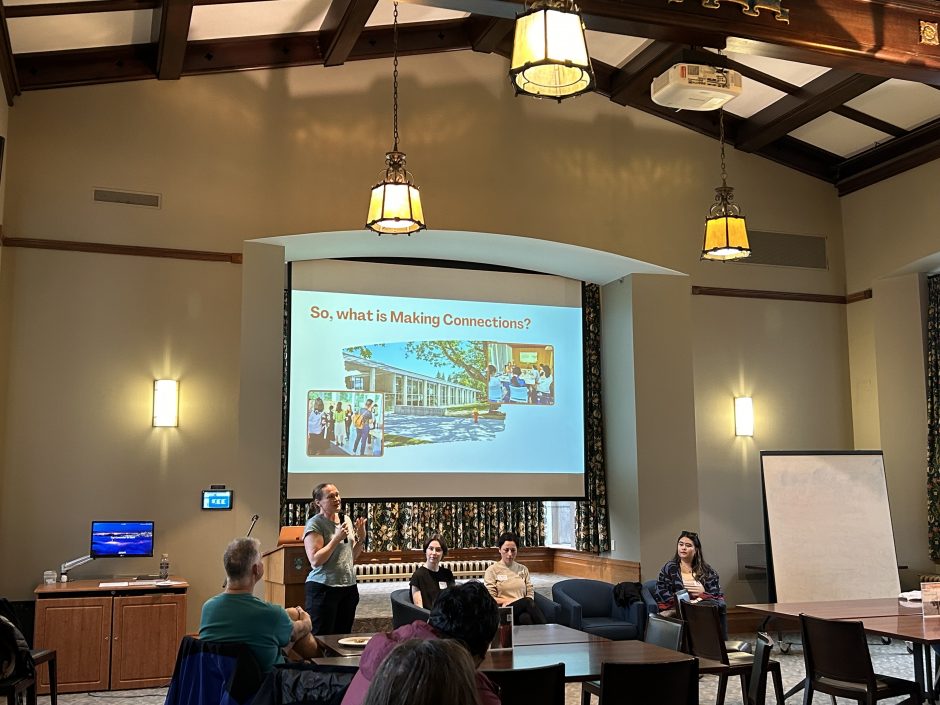Introduction
The importance of engaging with anti-colonial practices and Indigenous knowledges in biology is becoming more widely recognized and valued. With more interest and cross-campus initiatives, efforts to incorporate these topics in post-secondary biology courses have increased — the significance of centering student experiences and learning in the classroom is at the forefront of this work. Education professionals are working to develop curricula that will provide students with the knowledge and skills they need to pursue their passions, while also reflecting students’ values.
Making Connections is a cross-departmental team at UBC developing a new third-year biology course on natural history collections and biodiversity science set to pilot in January 2025. Beginning in May 2023, their core development team of five — including three student co-developers, each a current UBC undergrad — have been designing the course with the express intent of highlighting diverse perspectives, anti-colonial approaches, and Indigenous knowledges. From the start, Making Connections has intended for this course to reflect the diverse values, wants, and needs of not only field experts but also of the students who will be taking the new course.
In December 2023, in partnership with CTLT Indigenous Initiatives and Skylight, the Making Connections team organized the Classroom Climate Event: “Student Perspectives on Incorporating Indigenous Knowledges and Anti-Colonial Approaches to an Undergraduate Biology Course”. This blog highlights the experiences of the Making Connections Student Co-Developers with developing this new course, the process of integrating anti-colonial practices and Indigenous knowledges, and their key takeaways. Keep reading for their tips on how to meaningfully and sustainably support student staff involved in projects akin to theirs!
Classroom Climate Session


Making Connections began working with CTLT Indigenous Initiatives and Skylight in the project’s first months, and from early on there was interest in organizing a Classroom Climate Series session on Making Connection’s aims, approaches and the things that make the project unique. The classroom climate event provided the student co-developers the opportunity to share their experiences working on course development with interested UBC faculty and staff, calling attention to the different perspectives and skills students can bring and to the unique challenges they face completing this kind of work. The Making Connections team also had the chance to share their experiences and learn from others working to include anti-colonial practices and Indigenous knowledges in their courses.
The event brought in approximately 30 attendees; a mix of faculty and staff, some involved in teaching and some not. The student co-developers first introduced themselves and summarized the planned course content and logistics. The new course: “BIOL3XX: Introduction to Natural History Museums and Biodiversity Science” will pilot in January 2025. Course topics will include museum science and technology, specimen preparation, measures of biodiversity and the various professions and skills found in natural history museums and biodiversity science. The content and case studies that make up the course will highlight diversity, inclusivity, anticolonial and ethical approaches to these fields, as well as all the people behind the work. The course’s labs and lectures will run in a new hybrid space in the Biodiversity Research Center’s new expansion, accommodating 35-40 students. The course is designed to attract students of diverse backgrounds, faculties, interests, and aspirations — in turn it will be open to all UBC students with at least 2nd-year standing and have no required prerequisites. For additional details on the course’s planned content and logistics please see this slide deck.
At the event, student co-developers talked more in-depth about their experience conducting this work as it was a major point of interest for attendees. They discussed the challenges of often being the youngest people in the room, navigating academic spaces as undergraduates, being overlooked and treated as students instead of colleagues, and the positive impact of the incredible support they received throughout the term from their supervisors — see the following section for their tips on supporting undergraduate staff in projects like theirs. Following the presentation, the session broke off into four table groups, each with one Making Connections member present to answer questions and lead discussions. In these small groups, there were personal conversations about the students’ individual experiences and discussions about project attitudes, values and approaches.
Supporting and Celebrating Undergraduate Student Staff in Academic Workspaces
Projects like Making Connections are still new, and can look quite different depending on the students, supervisors, department they’re housed in, and what the project is. Considering this, the student co-developers put together a list of tips and tricks that they feel have made the project not only successful, but approachable and supportive to those involved.
- Regularly document thought processes and methodologies. Documentation facilitates reflection, iterative improvements, and succession planning for when student staff graduate or otherwise move on from a project — maintaining documentation is important both for current projects and to guide and inspire projects to come.
- Develop timelines early and collaboratively — leave room for flexibility. This works best once students have an idea of their semester’s workload (e.g. timing of midterms and other major assessments). Open communication and regular check-ins are key to keeping track of progress — do timelines need to be adjusted? Do workloads need to be redistributed?
- Leverage students’ individual strengths and interests when delegating tasks and designing outputs / deliverables, remember that each student has different experience and expertise — make sure to give them the autonomy to bring in skills or work that they are passionate about and play to their strengths.
- Have specific job titles and roles. Students will be better able to leverage their own skills and work as a team if their roles are clearly defined.
- For example, in Making Connections, when it comes time to design questions or surveys, the Evaluation Assistant takes the lead because it is outlined in the role. When the team needs a visual element for social media posts, the Project Assistant spearheads the design, as is specified in the job description. If the team wants to reach out to new community partners, that falls to the Partnerships Assistant. That way everyone knows who to defer to for specific items.
- Build in time for an intentional onboarding process. When starting in new roles, consider that students would benefit from having time dedicated to helping get them on their feet — introduce them to their role and workspace, provide initial tasks, and offer useful training materials. Make sure to also factor in time for students to explore by themselves, offer time to read and research important background information relevant to their project that interests them.
- Celebrate and recognize students’ work and contributions. Consider the discussion and include space for having students share and celebrate the great work they are doing in their studies. It’s especially helpful to continuously and vocally support and affirm the students’ role as co-developers/equals to collaborators.
- Cultivate a respectful space for learning and reflecting. Working in diverse groups with the aim of Indigenizing and decolonizing requires continuous learning and opportunity for reflection. Having a space for discussion and education between student developers, supervisors, and partners is crucial to achieving this projects’ goal of being inclusive.
Further Resources
- Beaty Biodiversity Museum blog (keep up with Making Connections here!)